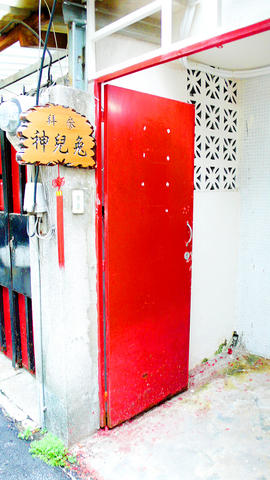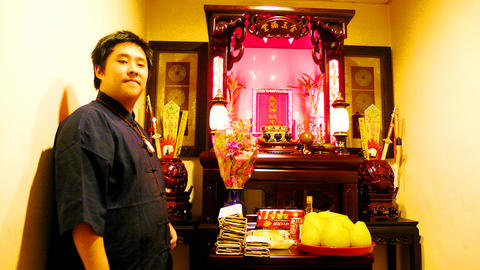On an overcast weekday afternoon, two men in their 20s walked into an unassuming temple nestled in an apartment building in Yonghe City (永和市). "We've been here before. We know the way," they told the priest's assistant, and proceeded to the altar on the second floor. A few minutes later, another young man went downstairs to have his fortune told by Lu Wei-ming (盧威明), a Taoist priest, or fashi (法師). Lu established and tends this shrine, known as the Rabbit Temple (兔兒廟), which is devoted to the rabbit deity (兔兒神) - the patron god of homosexuals.
The god isn't very well known, nor commonly worshipped, but he is based on an historical figure. According to the Tale of the Rabbit God that appears in the Zibuyu (子不語), a collection of supernatural stories written by Qing Dynasty scholar and poet Yuan Mei (袁枚, 1716-1798), Hu Tianbao (?#32993;天保) was an official in 18th-century, Qing Dynasty China. He fell in love with a handsome young imperial inspector of Fujian Province, but because of the inspector's higher status, Hu was afraid to reveal his feelings. After Hu was caught peeping at the inspector through a bathroom wall, he confessed his admiration for the inspector, who had him beaten to death. One month after his passing, the story goes, Hu appeared to a man from his hometown in a dream, claiming that the king of the underworld had appointed him the Rabbit God. As such, his duty was to govern the affairs of men who desire men. In the dream, he asked the man to erect a shrine to him.
As a priest, Lu often heard complaints from homosexual Taoist adherents that there was no god to answer their prayers. Believing one of his missions is to tend to the needs of people alienated from mainstream society, he set out to revive the forgotten deity. As his research suggests, Hu was an upper class historical figure who lived in Fujian from the late Ming Dynasty to the early Qing Dynasty. However, according to Michael Szonyi, associate professor of Chinese history at the department of East Asian Languages and Civilizations at Harvard, the Rabbit God is a pure invention of Yuan, the poet, since the image of the rabbit deity doesn't appear in any other sources from Fujian.

hotos: Ho Yi, Taipei Times
While some aspects of the story may be fabrications, the existence of the cult of Hu Tianbao in Fujian in the 18th century is well documented in official Qing records.
Historical Roots
In his Cult of Hu Tianbao and the 18th-Century Discourse of Homosexuality, which was published in the journal Late Imperial China in 1998, Szonyi discusses the evidence used by the government in its campaign against religious sects. The evidence was given by Zhu Gui (朱珪, 1731-1807), a grain tax who described the iconology of the cult as "two men embracing one another; the face of one is somewhat hoary with age, the other tender and pale." He went on to say that adherents, "on seeing young men desire to have intercourse with them, prayed for assistance from the plaster idol … . Afterwards they plastered the idol's mouth with pork intestine and sugar in thanks."

Photo: Ho Yi, Taipei Times
Later official records suggest that the sect was active in the 19th century, but as Szonyi points out, the chief evidence comes from edicts of imperial officials who tried to suppress the practice, therefore it is impossible to ascertain how the god was perceived from its adherents' point of view.
Lu says that "The deity can be seen as an alternative to Yue Xia Lao Ren (月下老人) [the matchmaker god]. I usually advise gay temple-goers not to go to Yu Lao, [the nickname of the matchmaker god], since love affairs between men and women are believed to be his responsibility. He will be confused by homosexuals' prayers and probably say to himself: 'The prayer doesn't seem right. I'll match you with a woman instead.'"
The Rabbit God is perceived to be an affable deity, Lu said, who is willing to assist his followers in every aspect of life. Since he works for Cheng Huang (城隍), the City God, he has both the erudition and social network in the spiritual world to solve any problem mortals have, according to Lu.
Homosexuals may have an edge in the spiritual world because, "Hu Tianbao is rather self-abased both because of the way he died and the somewhat belittling title of rabbit. So if you are willing to believe in him, he will be much more grateful and work harder than other deities," Lu said.
There are several methods of worshipping, asking for and receiving answers from this divine being, but sincerity is what counts most, Lu said. For this reason, followers should address the god as Ta Yeh (大爺), or master, rather than Rabbit God. Then, those with needs can write down their names, addresses, birthdays and prayers on pieces of paper money and burn them to make sure the messages are sent to heaven.
In another form of worship, personal items can be brought before the alter for Ta Yeh's blessings. Some followers believe that blessed skin-care products are more effective and increase the likelihood of romance. Followers can also take fu (符), paper charms, from the temple, place them under a pillow and pray to the deity to fulfill their wishes before going to bed. To Lu, the praying is meant to encourage contemplation.
sacred to secular
That is the spiritual side of the sect, but Lu is also concerned about the status of homosexuals in society, and that is a major reason for establishing the temple. "Religions both in the West and the East have long pushed the homosexual community into the margin," he said. "But providence is benign, and love is given to all human beings as equals." He also added that the temple is not merely for gay men, but lesbians as well.
Lu is planning religious gay weddings. He wants to deliver a message that religion recognizes the union of homosexual couples, and there is no reason why the state shouldn't do the same.
To a 25-year-old adherent - who requested to be identified as Philippe since his colleagues don't know he is gay - the temple offers a source of comfort in time of trouble. Admitting that he imagined the shrine would be a bit gruesome before the visit, Philippe noted that the whole experience was similar as that of visiting any other temple.
"Although I had a secular upbringing, I still feel the need to seek out comfort in religious faith, to know there is hope I can hold on to, a true love that is not far off," said the young internist, who said he would return to the shrine and give thanks to Ta Yeh if the dinner date after the gay parade last Saturday developed into a long-yearned-for relationship.

The primaries for this year’s nine-in-one local elections in November began early in this election cycle, starting last autumn. The local press has been full of tales of intrigue, betrayal, infighting and drama going back to the summer of 2024. This is not widely covered in the English-language press, and the nine-in-one elections are not well understood. The nine-in-one elections refer to the nine levels of local governments that go to the ballot, from the neighborhood and village borough chief level on up to the city mayor and county commissioner level. The main focus is on the 22 special municipality

The People’s Republic of China (PRC) invaded Vietnam in 1979, following a year of increasingly tense relations between the two states. Beijing viewed Vietnam’s close relations with Soviet Russia as a threat. One of the pretexts it used was the alleged mistreatment of the ethnic Chinese in Vietnam. Tension between the ethnic Chinese and governments in Vietnam had been ongoing for decades. The French used to play off the Vietnamese against the Chinese as a divide-and-rule strategy. The Saigon government in 1956 compelled all Vietnam-born Chinese to adopt Vietnamese citizenship. It also banned them from 11 trades they had previously

Hsu Pu-liao (許不了) never lived to see the premiere of his most successful film, The Clown and the Swan (小丑與天鵝, 1985). The movie, which starred Hsu, the “Taiwanese Charlie Chaplin,” outgrossed Jackie Chan’s Heart of Dragon (龍的心), earning NT$9.2 million at the local box office. Forty years after its premiere, the film has become the Taiwan Film and Audiovisual Institute’s (TFAI) 100th restoration. “It is the only one of Hsu’s films whose original negative survived,” says director Kevin Chu (朱延平), one of Taiwan’s most commercially successful

Jan. 12 to Jan. 18 At the start of an Indigenous heritage tour of Beitou District (北投) in Taipei, I was handed a sheet of paper titled Ritual Song for the Various Peoples of Tamsui (淡水各社祭祀歌). The lyrics were in Chinese with no literal meaning, accompanied by romanized pronunciation that sounded closer to Hoklo (commonly known as Taiwanese) than any Indigenous language. The translation explained that the song offered food and drink to one’s ancestors and wished for a bountiful harvest and deer hunting season. The program moved through sites related to the Ketagalan, a collective term for the